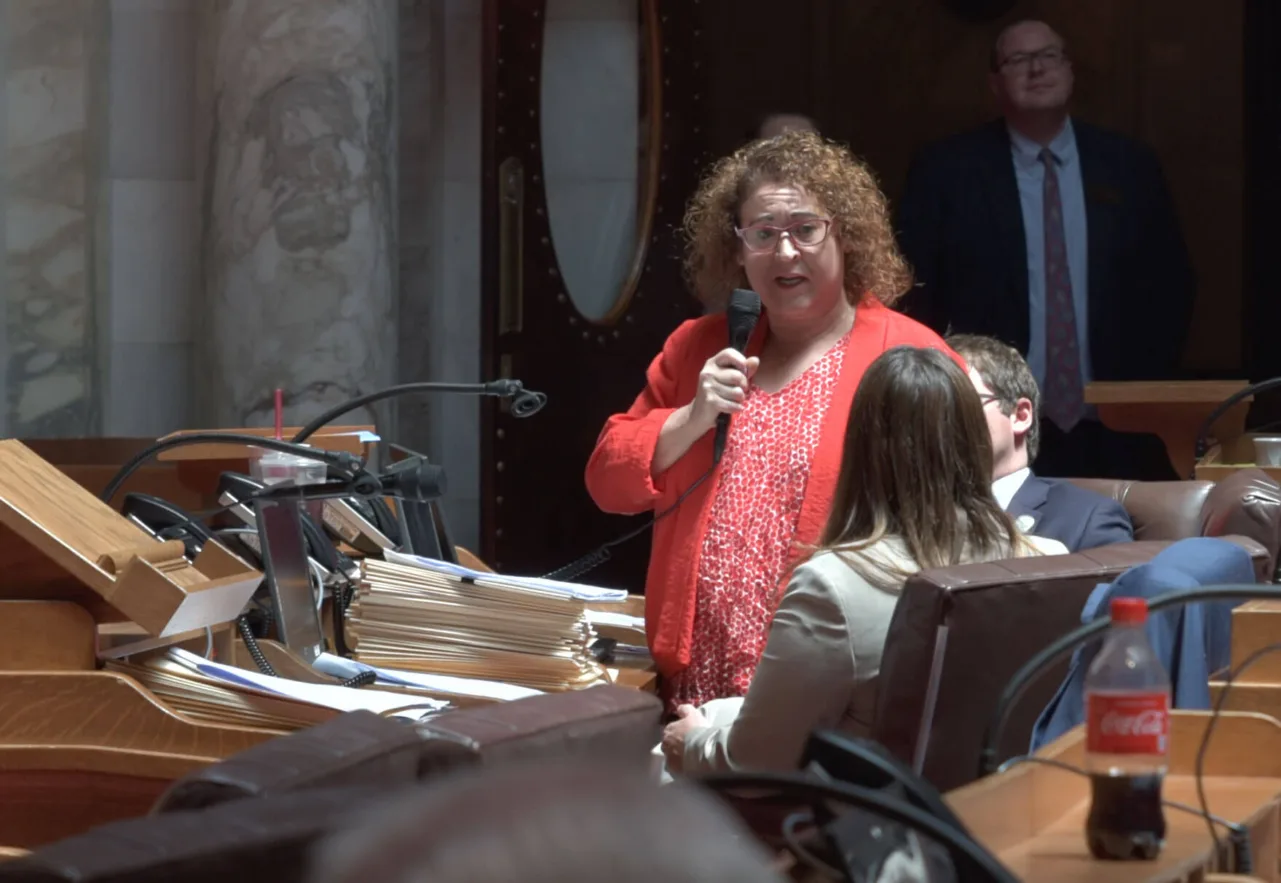
#image_title
State law still has a 1849 abortion ban on the books. The only thing holding it back is Roe v. Wade.
Rep. Lisa Subeck (D-Madison) wasn’t the first state legislator to propose repealing Wisconsin’s 1849 abortion ban.
Legislators have been proposing removing it ever since it became unenforceable in 1973 with the US Supreme Court’s decision in Roe v. Wade securing abortion rights nationwide, but those efforts never gained any traction.
“I think for a long time, people didn’t see it as a big deal,” Subeck said. “Didn’t think that it was a problem to have on our books because, ‘Gosh, it’s not enforceable anyway. It’s unconstitutional.’ It just wasn’t a priority.”
Years of warning signs that anti-abortion activitists were organizing to overthrow Roe came to a head when the Supreme Court allowed to go into effect a Texas law that bans all abortions after six weeks and is enforced through vigilantism: Private citizens can report people they believe to have obtained or helped someone obtain an abortion.
“What’s going on in Texas should alarm everyone, whether or not an individual is pro-choice,” Subeck said. “This is government by the extremes; this is an extreme group of legislators who passed a law that’s been signed by a governor who is on the fringes even of the right. It’s really terrifying because it will have a real impact for generations.”
RELATED: Supreme Court Upholds Obamacare Again, Saving Health Coverage for 2.4 Million in Wisconsin
Now Subeck and her Democratic colleagues’ concern about the unenforceable 1849 law has become alarm. Gov. Tony Evers has managed to keep some of the more extreme anti-abortion legislation from becoming law, but if Roe v. Wade is overturned, Wisconsin would automatically become an anti-abortion state.
Escalating Extremes
In the mid 1990’s, state lawmakers enacted a bill requiring abortion seekers to undergo counseling and wait 24 hours. Then, during former Gov. Scott Walker’s time in office, the Republican-led legislature passed bills further chipping away at abortion rights, enacting bills that cut off abortion access after 20 weeks and required the patient to undergo an ultrasound beforehand. But in 2018, Walker signaled that he wouldn’t go as far as a six week ban.
There have also been bills that were introduced but never passed that Subeck said “were clearly designed to test Roe,” such as a proposed amendment to the state constitution that would grant personhood rights as early as a fertilized egg.
There was also a package of bills passed by Republican lawmakers in the statehouse in 2019 and vetoed by Evers that included a lifetime sentence for doctors that do not provide medical care to an infant that is born after an attempted abortion. Democrats said it was redundant because it is already illegal not to provide care to an infant and that the bill’s real purpose was to make such instances seem more common than they are.

The other bills would have completely defunded Planned Parenthood for non-abortion services, barred abortion motivated by the sex or disability of the fetus, and require doctors to tell women they could “reverse” an abortion, a claim medical experts say is not credible.
The so-called reverse-abortion bill is not the only bill restricting abortion that is divorced from medical reality. Kristin Lyerly, an OB-GYN in Green Bay and member of the American College of Obstetricians and Gynecologists (ACOG) who unsuccessfully ran last year against Rep. John Macco (R-Green Bay), pointed to an Ohio bill that would have required doctors to move an ectopic pregnancy from the fallopian tube to the uterus or face charges of “abortion murder.” No such procedure is medically possible.
“We have to stop this crazy legislation,” Lyerly said. “It’s really important for [ACOG] to be engaged and to use our voices to say, this is not real. And it doesn’t serve women and families.”
Disconnected From Reality
That disconnect is also present in the Texas bill, which Lyerly called “sloppy.”
“There are so many loopholes in this bill and so many places where mistakes could be made,” she said. “It’s a ‘gotcha’ bill. This has nothing to do with communities with public health, with taking care of women. It has everything to do with punishing and controlling women.”
The Texas bill would punish anyone for aiding and abetting an abortion but doesn’t clearly define what that means, so it could apply to anyone from the patient to the doctor to the rideshare driver who unknowingly took someone to an appointment. At six weeks, Lyerly said most women don’t even know they’re pregnant and there is also no medical way to determine whether someone had an abortion or a miscarriage.
“The reality is nobody should have to prove whether they had a miscarriage or an abortion. The reality is that abortion should be safe and legal,” Subeck said. “We saw that before 1973, we saw women died, women were irreparably damaged. Their health, their reproductive systems were irreparably damaged, trying to obtain either illegal abortions or trying to self-abort out of desperation and not having any options. Women whose life was at risk died because they couldn’t get an abortion. I think that we have to face the reality that this is about health and safety.”
In addition to being divorced from medical reality, such bills are also divorced from social reality. Because both Subeck and Lyerly pointed out that making abortion illegal is not going to end abortion. Women with resources will be able to travel to access abortion; making it illegal in Wisconsin will only end abortion access for vulnerable women.
“We’re putting our already most vulnerable individuals at risk, whether those are low-income individuals, young people, whomever that might be,” Subeck said. “There are also times where somebody is seeking an abortion at a time when they’re already medically very fragile. And the idea that somebody who is facing a medical crisis, whose health is in danger, and is choosing to terminate a pregnancy in order to preserve their health, would suddenly have to travel elsewhere and may not be able to do that in order to access abortion is utterly absurd and really terrifying.”
Lyerly said that, as someone who has been in a room with women who are making these decisions, the idea of not being able to provide an abortion to someone who needs one is unfathomable, because she’s found that every woman making that decision had a reason for doing so.
“I don’t think that these bills are focused on women’s care whatsoever,” Lyerly said. “If you really want to understand what happens, you need to hear the stories that these women tell. Every woman who walks through the door has a personal story. Whether it’s that she can’t afford to have a pregnancy now or another pregnancy; whether it’s that she was using every form of contraception correctly and this was just a contraception failure; whether this was a case or incest or rape, or she’s in an abusive situation; or it just isn’t the right time for her. It doesn’t matter what the reason is, but every woman has a reason for seeking an abortion.”

Harris proposes plan to have Medicare cover in-home care for seniors, give relief to family caregivers
Under Harris’ plan, Medicare would cover the cost of in-home health care for seniors enrolled in the program, after a medical provider has...

Kamala Harris and Tony Evers bring new ideas designed to help the elderly, disabled, and their home caregivers
The vice president unveils a plan for Medicare coverage of vision, hearing, and home care—paid for by negotiating lower drug prices with Big...

Harris seeks to lower drug costs for Wisconsinites, building on recent progress
Harris wants to expand the $35 monthly cap on insulin costs and a $2,000 annual cap on out-of-pocket drug costs so that they apply to all Americans,...

Everything you need to know about the new flu and COVID vaccines
Fall is coming, which not only means cooler temps and blazing leaves, but also an uptick in coughs and sniffles, and every parent’s favorite game:...




